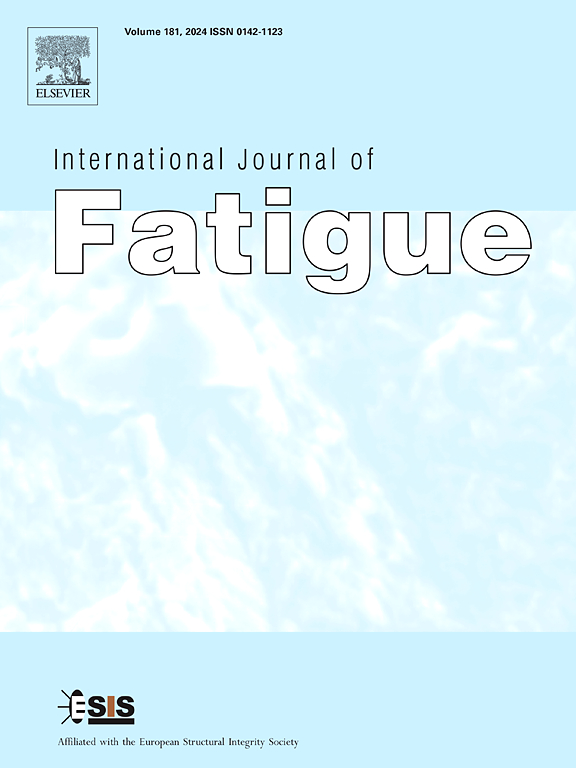Effect of microstructure rafting on deformation behaviour and crack mechanism during high-temperature low-cycle fatigue of a Ni-based single crystal superalloy
IF 5.7
2区 材料科学
Q1 ENGINEERING, MECHANICAL
引用次数: 0
Abstract
The low cycle fatigue behaviours of a microstructure rafting Ni-based single crystal superalloy have been experimentally investigated at 980 ℃. Deformation of γ/γ’ phases and the corresponding dislocation configurations were investigated, highlighting rafting γ/γ’ morphology that contributes to crack initiation and propagation, as well as macro-scale accumulated plastic strain. Unlike the discrete slip lines of a virgin superalloy, intense slips developed along the parallel {111} slip plane result in crossed slip bands in the rafting superalloy. The decreased resistance of widened γ channels to dislocation movement, along with the prevention of dislocation cutting through γ’ precipitates in pre-existing dense dislocation networks, facilitates crack propagation in the γ channel in the slightly rafting superalloy. As the rafting state increases, the dislocation network loses its protective effect by reducing coherency stress and acting as a superdislocation source, which facilitates crack propagation along the γ/γ’ interface. Finally, a microstructure-based fatigue model is developed considering the reduction of deformation resistance induced by rafting. The fatigue loading control mode effect is introduced by a combination of resolved shear stress and tensile stress effects on crack initiation. The LCF life of rafting Ni-based superalloys significantly decreases under stress-controlled conditions compared to strain-controlled conditions due to the increase in cumulative plastic strain. However, the insignificant impact of the initial surface oxide layer on LCF life is revealed.
微结构筏化对镍基单晶超合金高温低循环疲劳过程中的变形行为和裂纹机制的影响
在 980 ℃ 下对一种微结构筏状镍基单晶超级合金的低循环疲劳行为进行了实验研究。研究了γ/γ'相的变形和相应的位错构型,突出显示了筏状γ/γ'形态对裂纹萌生和扩展以及宏观累积塑性应变的影响。与原始超耐热合金的离散滑移线不同,沿平行{111}滑移面发展的强烈滑移导致筏式超耐热合金中出现交叉滑移带。加宽的 γ 通道对位错运动的阻力减小,同时阻止了位错切割预先存在的密集位错网络中的γ'析出物,从而促进了轻微筏化超耐热合金中 γ 通道的裂纹扩展。随着筏化状态的增加,位错网络会失去保护作用,降低相干应力并成为超位错源,从而促进裂纹沿γ/γ'界面扩展。最后,考虑到漂移引起的变形抗力降低,建立了基于微结构的疲劳模型。疲劳加载控制模式效应是由裂纹萌生时的剪应力和拉应力效应共同作用产生的。与应变控制条件相比,由于累积塑性应变的增加,筏化镍基超合金在应力控制条件下的 LCF 寿命明显缩短。然而,初始表面氧化层对 LCF 寿命的影响并不明显。
本文章由计算机程序翻译,如有差异,请以英文原文为准。
求助全文
约1分钟内获得全文
求助全文
来源期刊

International Journal of Fatigue
工程技术-材料科学:综合
CiteScore
10.70
自引率
21.70%
发文量
619
审稿时长
58 days
期刊介绍:
Typical subjects discussed in International Journal of Fatigue address:
Novel fatigue testing and characterization methods (new kinds of fatigue tests, critical evaluation of existing methods, in situ measurement of fatigue degradation, non-contact field measurements)
Multiaxial fatigue and complex loading effects of materials and structures, exploring state-of-the-art concepts in degradation under cyclic loading
Fatigue in the very high cycle regime, including failure mode transitions from surface to subsurface, effects of surface treatment, processing, and loading conditions
Modeling (including degradation processes and related driving forces, multiscale/multi-resolution methods, computational hierarchical and concurrent methods for coupled component and material responses, novel methods for notch root analysis, fracture mechanics, damage mechanics, crack growth kinetics, life prediction and durability, and prediction of stochastic fatigue behavior reflecting microstructure and service conditions)
Models for early stages of fatigue crack formation and growth that explicitly consider microstructure and relevant materials science aspects
Understanding the influence or manufacturing and processing route on fatigue degradation, and embedding this understanding in more predictive schemes for mitigation and design against fatigue
Prognosis and damage state awareness (including sensors, monitoring, methodology, interactive control, accelerated methods, data interpretation)
Applications of technologies associated with fatigue and their implications for structural integrity and reliability. This includes issues related to design, operation and maintenance, i.e., life cycle engineering
Smart materials and structures that can sense and mitigate fatigue degradation
Fatigue of devices and structures at small scales, including effects of process route and surfaces/interfaces.
 求助内容:
求助内容: 应助结果提醒方式:
应助结果提醒方式:


